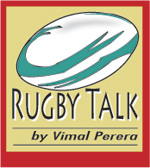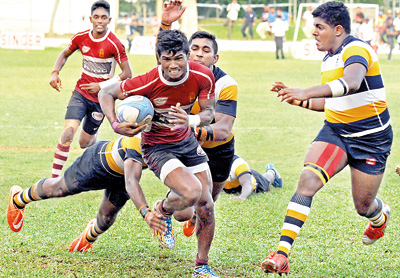Learning to manage referee ‘manthra’ at crux games
View(s):Jim Collins in his book ‘Good to Great’ says that good is the enemy of great. We talk of good companies, good schools, good people, good clubs, as well as good teams. But do we talk of great? We have finished the school league and about to finish the knock-outs. Have we had great teams at least from a local perspective? Benchmarking against the schools in the region is another matter. That is probably the way to gauge progress.
 Collins in his research for great companies developed a set of key performance indicators and matched it over a period of fifteen years. Applying an analysis to school rugby taking one aspect of continuous performance we may have as little as three or four schools that have continuously been performing at the top. If you take the performance over the last fifteen years there has been no consistent or dominant demonstrations. There has been two teams winning the league four times each and two teams win two times each. Maybe we could add to this teams that have come within the first three in the 16 years 2000 to 2015 inclusive. You may come within probably five schools that may have been at the top and include Isipathana, Royal, Trinity, St. Peter’s and Kingswood. Of these St. Peter’s and Kingswood have hit a disastrous low this year. Maybe we could add the sevens score sheet to this as well as the knock-out to get more sense on whether we have good or great teams. A study of the performance is important as this will help the future of the game in the country as it is from here that the mentality of greatness comes to the club and the national teams.
Collins in his research for great companies developed a set of key performance indicators and matched it over a period of fifteen years. Applying an analysis to school rugby taking one aspect of continuous performance we may have as little as three or four schools that have continuously been performing at the top. If you take the performance over the last fifteen years there has been no consistent or dominant demonstrations. There has been two teams winning the league four times each and two teams win two times each. Maybe we could add to this teams that have come within the first three in the 16 years 2000 to 2015 inclusive. You may come within probably five schools that may have been at the top and include Isipathana, Royal, Trinity, St. Peter’s and Kingswood. Of these St. Peter’s and Kingswood have hit a disastrous low this year. Maybe we could add the sevens score sheet to this as well as the knock-out to get more sense on whether we have good or great teams. A study of the performance is important as this will help the future of the game in the country as it is from here that the mentality of greatness comes to the club and the national teams.
 If you use a similar yardstick to the clubs we may find that Kandy SC has been consistent while others have been climbing and dropping with Navy SC making a concerted effort during recent times. Similarly one may look at the national team whose performance in the Asian Circuit over the last ten years is a good indication of whether we are good for some and not great yet. In our quest to look at the great my focus is on schools rugby with the season being just finished. How many of the schools can leap to good and then jump to great and sustain same over a period of time? It is a matter of sustaining and working towards same with a plan. But the great team should not be measured purely by wins but should include other factors such as the number of tries scored, players who went to represent the Under-20 national team, the discipline which include the reduction of red and yellow cards. Great teams will have sportsmanship above all and there will not be any walk outs, assaults and or abandoning matches.
If you use a similar yardstick to the clubs we may find that Kandy SC has been consistent while others have been climbing and dropping with Navy SC making a concerted effort during recent times. Similarly one may look at the national team whose performance in the Asian Circuit over the last ten years is a good indication of whether we are good for some and not great yet. In our quest to look at the great my focus is on schools rugby with the season being just finished. How many of the schools can leap to good and then jump to great and sustain same over a period of time? It is a matter of sustaining and working towards same with a plan. But the great team should not be measured purely by wins but should include other factors such as the number of tries scored, players who went to represent the Under-20 national team, the discipline which include the reduction of red and yellow cards. Great teams will have sportsmanship above all and there will not be any walk outs, assaults and or abandoning matches.
What will be important to those who are interested in getting to be great are not the common factors these top good teams have but the factors that distinguish them from the others. Is it men, skills, ground, coaches, money or other factors? If we consider that the top teams had coaches so did the other teams that did not make it to the top. The factors that distinguish the teams that came to the top are important if it means anything to the hype pundits. The issue of whether compensation or money has been a cause for success is important as we see Science College, who were less affluent coming within the first four. What is important for a team of this nature is not only to focus on what they should do to become great but also to focus on what they should not do. The chanting that the referees are sucking the better known schools is something that needs attention on what not to do. This takes the focus away from the main job on hand; that is to be great. When you are on the road to be great with right conditions the problems of commitment motivation etc will fade away. A classic example of losing the way was 2013 winners Dharmaraja who have been unable to sustain themselves. What not do is important as much as what to do. As Collins says it is about getting the right people on the bus and the wrong people off the bus and the right people in the right seats and then figure where you want to drive it. If not it would be like monkey management. The monkey at the top looks down and thinks he sees a smiling face looking up while other monkeys keep going up and coming down. Those at the top do not realise of what the monkeys at the bottom see every time they look up.
* Vimal Perera is a former player, coach, referee and an IRB Accredited Referees’ Educator


